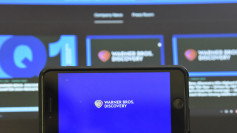A former Microsoft software engineer has been found guilty of 18 federal felonies for using fake accounts to steal over $10 million worth of digital currency, the US Justice Department disclosed on Tuesday.
Court records showed that Volodymyr Kvashuk, from Renton, Washington, used the money to construct a $1.6 million lakefront home, buy a $160,000 Tesla, and other lavish items, the DOJ said.
The DOJ said Kvashuk has been convicted of six counts of money laundering, five counts of wire fraud, two counts of false tax returns, two counts of identity theft, and one count each of mail and access device fraud after a five-day deliberation.
Kvashuk, a 25-year old Ukranian, was a former contractor and employee of Microsoft Corp from 2016 to 2018. His sentencing is set to take place on June 1, and he faces up to 20 years imprisonment.
According to documents and court testimony, Kvashuk was involved in testing an online retail platform for Microsoft and used the "trial access" to steal millions of dollars worth of electronic gift cards. He resold the gift cards on the internet for cryptocurrency.
Kvashuk pilfered smaller amounts at first, totaling around $12,000 and took advantage of his own account to access the retail platform. As the thefts grew and reached millions of dollars, he used other staff's trial email accounts. Microsoft was eventually defrauded out of more than $10 million in a seven-month period.
In order to conceal his nefarious acts, Kvashuk not only used accounts that belonged to other employees but also used digital currency services are known as 'mixing' before depositing the stolen funds into his own accounts -- including $2.8 million in Bitcoins. This particular deposit was disguised under a bogus gift from a relative via the filing of a deceitful tax return.
Microsoft confronted Kvashuk and terminated him as soon as the company discovered the theft and the criminal complaint led to the eventual court trial. At the proceedings, Kvashuk argued that it was not his intention to steal from Microsoft and claimed he was working on a project to benefit his co-workers. Prosecutors argued that he "hid behind his colleagues' names" and defrauded the company "every step of the way."
Corporate fraud comes in many variations, but for a lot of companies, the most surprising threat is the one that comes from within the company itself. Among the most common types of corporate theft is expense fraud, but payroll fraud is another common occurrence.






